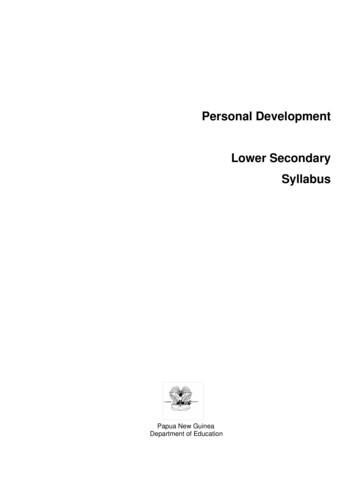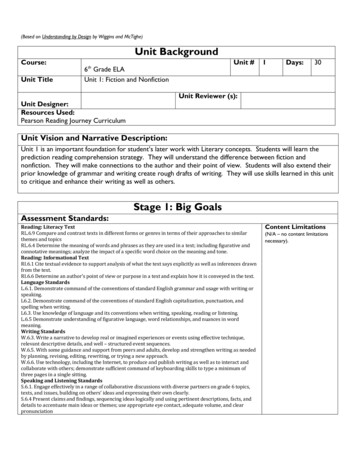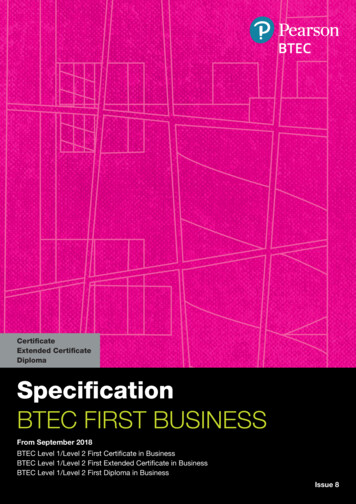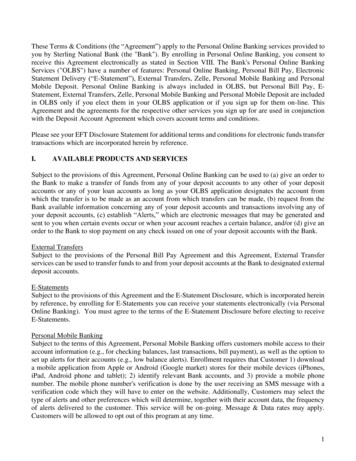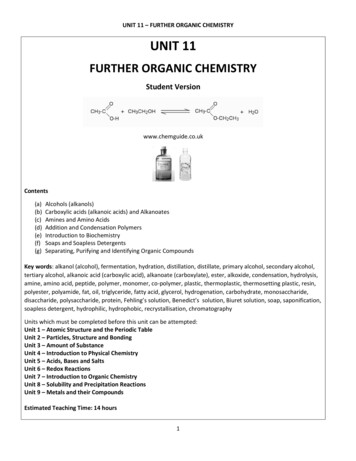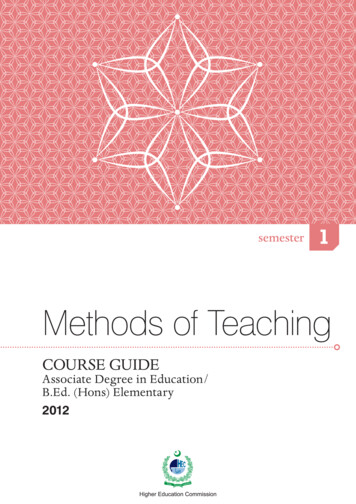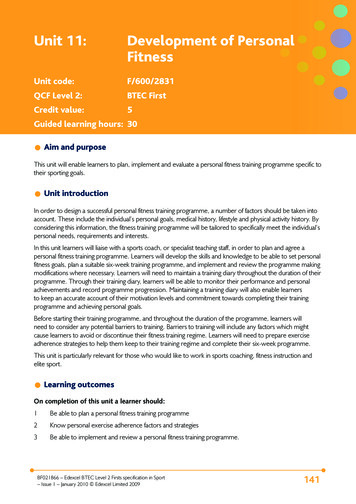
Transcription
Unit 11:Development of PersonalFitnessUnit code:F/600/2831QCF Level 2:BTEC FirstCredit value:5Guided learning hours: 30Aim and purposeThis unit will enable learners to plan, implement and evaluate a personal fitness training programme specific totheir sporting goals.Unit introductionIn order to design a successful personal fitness training programme, a number of factors should be taken intoaccount. These include the individual’s personal goals, medical history, lifestyle and physical activity history. Byconsidering this information, the fitness training programme will be tailored to specifically meet the individual’spersonal needs, requirements and interests.In this unit learners will liaise with a sports coach, or specialist teaching staff, in order to plan and agree apersonal fitness training programme. Learners will develop the skills and knowledge to be able to set personalfitness goals, plan a suitable six-week training programme, and implement and review the programme makingmodifications where necessary. Learners will need to maintain a training diary throughout the duration of theirprogramme. Through their training diary, learners will be able to monitor their performance and personalachievements and record programme progression. Maintaining a training diary will also enable learnersto keep an accurate account of their motivation levels and commitment towards completing their trainingprogramme and achieving personal goals.Before starting their training programme, and throughout the duration of the programme, learners willneed to consider any potential barriers to training. Barriers to training will include any factors which mightcause learners to avoid or discontinue their fitness training regime. Learners will need to prepare exerciseadherence strategies to help them keep to their training regime and complete their six-week programme.This unit is particularly relevant for those who would like to work in sports coaching, fitness instruction andelite sport.Learning outcomesOn completion of this unit a learner should:1Be able to plan a personal fitness training programme2Know personal exercise adherence factors and strategies3Be able to implement and review a personal fitness training programme.BF021866 – Edexcel BTEC Level 2 Firsts specification in Sport– Issue 1 – January 2010 Edexcel Limited 2009141
Unit content1 Be able to plan a personal fitness training programmeGoal setting: short-term, medium-term and long-term; importance of goal settingInformation: eg personal goals, lifestyle, medical history, physical activity history, dietary history, dietarypreferences, supplement use, nutritional knowledge, attitudes and motivationPhysical fitness training programme: aims and objectives; principles of training (frequency, intensity, time,type, overload, specificity, progression, individual differences, variation, reversibility); warm up and cooldown; training methods eg flexibility (static stretching, ballistic stretching, proprioceptive neuromuscularfacilitation – PNF – stretching), strength, muscular endurance and power (resistance machines, circuittraining, free weights, plyometrics), aerobic endurance (continuous training, fartlek training, intervaltraining), speed training (interval training, fartlek training)2 Know personal exercise adherence factors and strategiesExercise adherence factors: overcoming barriers eg access to facilities, time, motivation, cost;implementing enjoyable activities; benefits of the personal fitness training programmeExercise adherence strategies: eg setting SMART (specific, measurable, achievable, realistic, time-bound)targets, support and reinforcement, rewards for achieving goals3 Be able to implement and review a personal fitness training programmeImplement: eg take part in planned sessions, perform to best of ability, gain agreement for any missedsessions, importance of commitmentTraining diary: log of performance and achievement; programme progression; motivation for trainingReview: during and post implementation; modify programme to achieve planned goalsStrengths: areas of the programme where aims and objectives have been achievedAreas for improvement: where outcomes do not meet planned goals142BF021866 – Edexcel BTEC Level 2 Firsts specification in Sport– Issue 1 – January 2010 Edexcel Limited 2009
Assessment and grading criteriaIn order to pass this unit, the evidence that the learner presents for assessment needs to demonstrate thatthey can meet all the learning outcomes for the unit. The assessment criteria for a pass grade describe thelevel of achievement required to pass this unit.Assessment and grading criteriaTo achieve a pass grade theevidence must show that thelearner is able to:To achieve a merit grade theevidence must show that, inaddition to the pass criteria,the learner is able to:P1M1 contribute own ideas to thedesign of a six-week personalfitness training programmeplan, design and agree, a sixweek personal fitness trainingprogramme with a coachTo achieve a distinction gradethe evidence must show that,in addition to the pass andmerit criteria, the learner isable to:[IE1, TW1, TW2, CT1, RL2]P2describe personal exerciseadherence factors andstrategiesP3implement a six-weekpersonal fitness trainingprogramme, maintaining atraining diaryM2 explain personal exerciseadherence factors andstrategiesD1evaluate personal exerciseadherence strategies forovercoming barriers toexercise[RL3, SM2, SM3]P4describe the strengths ofthe personal fitness trainingprogramme, identifying areasfor improvement.M3 explain the strengths of theD2personal fitness trainingprogramme, makingsuggestions for improvement.justify suggestions relatedto identified areas forimprovement in the personalfitness training programme.[RL1, RL3]PLTS: This summary references where applicable, in the square brackets, the elements of the personal,learning and thinking skills applicable in the pass criteria. It identifies opportunities for learners to demonstrateeffective application of the referenced elements of the skills.KeyIE – independent enquirersRL – reflective learnersSM – self-managersCT – creative thinkersTW – team workersEP – effective participatorsBF021866 – Edexcel BTEC Level 2 Firsts specification in Sport– Issue 1 – January 2010 Edexcel Limited 2009143
Essential guidance for tutorsDeliveryTutors should introduce the unit by identifying the principles of training and the training methods available.The unit has a large practical component. It is recommended that learners actively participate and experiencea number of training methods to gain a ‘taster’ of which methods they might best use in their trainingprogramme.Learners need to work with a sports coach, instructor or other appropriate adviser to plan and implementa personal fitness training programme. Before planning the personal fitness training programme learnersshould cover the theory behind fitness training programme design. The different methods of training shouldbe identified and, where possible, experienced practically. Learners also need to understand the principles oftraining and be able to apply these principles to their programme design. The importance of setting SMARTgoals needs to be covered, and examples of suitable goals provided. Learners need to be aware of thefactors that might prevent them from completing their six-week fitness training programme and how exerciseadherence strategies can be used effectively to prevent this from occurring.The final part of the unit requires learners to implement and review their personal fitness training programme.The training programme should be implemented for a period of six weeks and learners should maintain atraining diary to log their personal performance, progression, motivation levels and continued commitment tocompleting the training programme. Learners should be introduced to the benefits of keeping training diariesand the information that needs to be recorded. Learners should review their training programme and willneed to describe the strengths of their programme, taking into account information collated in their trainingdiary, and identify areas which could be improved in order to achieve planned goals. Skills in evaluating afitness training programme can be developed using case studies.144BF021866 – Edexcel BTEC Level 2 Firsts specification in Sport– Issue 1 – January 2010 Edexcel Limited 2009
Outline learning planThe outline learning plan has been included in this unit as guidance and can be used in conjunction with theprogramme of suggested assignments.The outline learning plan demonstrates one way in planning the delivery and assessment of this unit.Topic and suggested assignments/activities and/assessmentIntroduction and overview of the unitConsidering medical history and physical activity history – use of exemplar questionnaires to collate informationExploring dietary history and knowledge – learner activities and group discussionAssignment 1: Plan and Implement a Personal Fitness Training Programme (P1, M1, P2, M2, D1, P3, P4,M3, D2). Tutor introduces the whole unit assignment brief and programme designLearner research task: personal goals, lifestyle, motivation and feedback to the group – goal settingConsidering principles of training – interactive lecturePlanning a personal fitness training programme: including gaining agreement from coach/trainer and discussion ofexercise adherence issuesPlanning a training diary – essential aspects and designExercise adherence factors and strategies – group discussion and activitiesImplement the fitness training programme and maintain a training diary. Training programme to be implementedfor a six-week period. Includes time allocated for learners to undertake training in own time and keep theirtraining diary updatedLearner to liaise with coach/trainer to check progression – modify programme accordinglyProgramme review and evaluationReview of the unit and assessment activitiesBF021866 – Edexcel BTEC Level 2 Firsts specification in Sport– Issue 1 – January 2010 Edexcel Limited 2009145
AssessmentFor P1, learners need to design a personal fitness training programme developed and agreed with a coach orother appropriate adviser. The programme must cover a period of at least six weeks and be suitable for thelearner’s needs and goals. The programme should also apply the principles of training as stated in the Unitcontent. Suitable methods of training should be selected. For P2, learners need to describe personal exerciseadherence factors, and strategies that they can implement which will help them complete their programme. Awritten report or recorded discussion with their coach or tutor would provide suitable evidence.For P3, learners need to undertake a six-week personal fitness training programme. Evidence of participationshould be recorded in a training diary which identifies the training carried out and records the date and detailsof each session. The training diary will also need to include details of modifications made to the programme inorder to achieve planned goals and maintain motivation for training.For P4, learners need to review their training programme, describing the strengths and areas forimprovement. A written report or recorded discussion with their coach or tutor would provide suitableevidence.Grading criterion M1 links to P1, and requires learners to play a more active role in the design of a personalfitness training programme, contributing a number of their own ideas. Evidence of this could be in the formof written notes of a discussion with a coach or tutor and/or a tape recording. The programme must cover aperiod of at least six weeks and be suitable for the learner’s needs and goals.For M2, which links to P2, learners need to explain personal exercise adherence factors and strategies.Learners need to set out in detail their exercise adherence factors and strategies for overcoming barriers,providing reasons and/or evidence to show how these will help them to complete their six-week trainingprogramme.For M3, which links to P4, learners need to review their programme, explaining the strengths and providingrecommendations for improvement.Grading criterion D1 builds on M2, and requires learners to evaluate their personal exercise adherencestrategies for overcoming barriers to exercise. Learners should consider each strategy carefully and providereasons and/or evidence for their views or statements. For D2, which builds on M3, learners need to justifytheir suggestions for improving their personal fitness training programme. Learners will need to providereasons to show how they arrived at their conclusions. This may include why frequency, intensity, time andtype(s) of training have changed or why the structure of the training year has changed.Programme of suggested assignmentsThe table below shows a programme of suggested assignments that cover the pass, merit and distinctioncriteria in the assessment and grading grid. This is for guidance and it is recommended that centres eitherwrite their own assignments or adapt any Edexcel assignments to meet local needs and resources.Criteria coveredAssignment titleScenarioAssessment methodP1, M1, P2, M2, D1, P3,P4, M3, D2Plan and Implement aPersonal Fitness TrainingProgrammeYou would like to improveyour fitness levels toenhance your sportsperformance and overallhealth and wellbeing.Practical observation andassessmentPlan a personal fitnesstraining programme witha coach, implement theprogramme for a periodof six weeks and reviewthe programme success.Training diary146Written reportTraining programmeBF021866 – Edexcel BTEC Level 2 Firsts specification in Sport– Issue 1 – January 2010 Edexcel Limited 2009
Links to National Occupational Standards, other BTEC units, other BTECqualifications and other relevant units and qualificationsThis unit forms part of the BTEC Sport sector suite. This unit has particular links with the following unit titles inthe BTEC Sport suite and the BTEC Sport and Exercise Sciences suite:Level 2 SportLevel 3 SportLevel 3 Sport and ExerciseSciencesAnatomy and Physiology for SportSports CoachingSports CoachingFitness Testing and TrainingLeadership in SportExercise, Health and LifestyleTechnical Skills and TacticalAwareness for SportExercise, Health and LifestyleInstructing Physical Activity andExercisePsychology for Sports PerformanceInstructing Physical Activity andExerciseExercise for Specific GroupsPlanning and Leading SportsActivitiesExercise for Specific GroupsFitness Testing for Sport andExerciseExercise and Fitness InstructionFitness Testing for Sport andExerciseFitness Training and ProgrammingFitness Training and ProgrammingThis unit links with the National Occupational Standards (NOS) for: Coaching, Teaching and Instructing at Level 2 Achieving Excellence in Sports Performance at Level 3.Essential resourcesLearners need access to an appropriate area to undertake the practical and physical elements of the unit suchas a sports hall or gym. Learners will also need to have dialogue with a sports coach, tutor, instructor or otherappropriate adviser in order to plan their personal fitness training programme.Employer engagement and vocational contextsIn order to undertake this unit successfully, learners need to be able to explore examples of fitness trainingprogrammes and training methods. Learners will need access to a practising sports coach, tutor, instructor orother appropriate adviser to enable them to plan a personal fitness training programme.BF021866 – Edexcel BTEC Level 2 Firsts specification in Sport– Issue 1 – January 2010 Edexcel Limited 2009147
Indicative reading for learnersTextbooksAckland J – The Complete Guide to Endurance Training (A&C Black, 2007) ISBN 9780713679038Adams M, Beashel P, Hancock J, Harris B, Phillippo P, Sergison A and Taylor I – BTEC Level 2 First Sport StudentBook (Pearson, January 2010) ISBN 9781846906220Adams M, Beashel P, Harris B, Johnson S, Phillippo P and Sergison A – BTEC Level 2 First Sport TeachingResource Pack (Pearson, April 2010) ISBN 9781846907173Allen M B – Sports Exercise and Fitness: A Guide to Reference and Information Sources (Libraries Unlimited Inc,2005) ISBN 9781563088193American College of Sports Medicine and Schwarzenegger A – ACSM Fitness Book (Human Kinetics Europe,2003) ISBN 9780736044066Bean A – The Complete Guide to Strength Training (A&C Black, 2008) ISBN 9781408105399Bird S R et al – Exercise Benefits and Prescription (Stanley Thornes, 1998) ISBN 9780743733156Chu D A – Jumping into Plyometrics, 2nd Edition (Human Kinetics, 1998) ISBN 9780736000963Dick F W – Sports Training Principles (A&C Black, 2007) ISBN 9780713682786Fulcher K and Fox P – Your Personal Trainer: The Ultimate Guide to Getting Fit for any Sport (Metro Books,2002) ISBN 9781843580027Hazeldine R – Fitness for Sport (The Crowood Press, 2000) ISBN 9781861263360Lawrence M – The Complete Guide to Core Stability (A&C Black, 2007) ISBN 9780713683479Moran G T and McGlynn G – Cross Training for Sports: Programmes for 26 Sports (Human Kinetics, 1997)ISBN 9780880114936Norris C M – The Complete Guide to Stretching (A&C Black, 2007) ISBN 9780713683486Rushall B S – Training for Sports and Fitness (Palgrave Macmillan, 1991) ISBN 9780732901899Scott A – GCSE PE for Edexcel (Heinemann, 2001) ISBN 9780435506360Sharkey B J and Gaskill S E – Fitness and Health (Human Kinetics, 2006) ISBN 9780736056144JournalsAmerican College of Sport Medicine’s Health and Fitness JournalBritish Journal of Sports MedicineExercise and Sport Sciences ReviewsInternational Journal of Sports Science and CoachingMedicine and Science in Sports and ExerciseResearch Quarterly for Exercise and Sport148BF021866 – Edexcel BTEC Level 2 Firsts specification in Sport– Issue 1 – January 2010 Edexcel Limited 2009
WebsitesAmerican College of Sports Medicinewww.acsm.orgBritish Association of Sport and Exercise Scienceswww.bases.org.ukHuman Kineticswww.humankinetics.comSport Sciencewww.sportsci.orgSports Coach UKwww.sportscoachuk.orgTop End Sportswww.topendsports.comDelivery of personal, learning and thinking skills (PLTS)The table below identifies the opportunities for personal, learning and thinking skills (PLTS) that have beenincluded within the pass assessment criteria of this unit.SkillWhen learners are Independent enquirersplanning, designing and agreeing, a six-week personal fitness training programmewith a coachCreative thinkersplanning, designing and agreeing, a six-week personal fitness training programmewith a coachReflective learnersplanning, designing and agreeing, a six-week personal fitness training programmewith a coachimplementing a six-week personal fitness training programme, maintaining atraining diarydescribing the strengths of the personal fitness training programme, identifyingareas for improvementTeam workersplanning, designing and agreeing, a six-week personal fitness training programmewith a coachSelf-managersimplementing a six-week personal fitness training programme, maintaining atraining diaryAlthough PLTS are identified within this unit as an inherent part of the assessment criteria, there are furtheropportunities to develop a range of PLTS through various approaches to teaching and learning.SkillWhen learners are Independent enquirersdiscussing potential training programmes with a coachCreative thinkersexploring potential training opportunities with a coachReflective learnersresearching the training methods available and their application to own sportsperformanceTeam workersexploring potential training opportunities with a coachSelf-managersresearching the training methods available and their application to own sportsperformanceBF021866 – Edexcel BTEC Level 2 Firsts specification in Sport– Issue 1 – January 2010 Edexcel Limited 2009149
Functional Skills – Level 2SkillWhen learners are ICT – Use ICT systemsSelect, interact with and use ICT systemsindependently for a complex task to meet avariety of needsresearching exemplar questionnaires including medical andphysical activity historyUse ICT to effectively plan work andevaluate the effectiveness of the ICT systemthey have useddesigning a personal fitness training programmeManage information storage to enableefficient retrievalmaintaining a training diaryICT – Find and select informationSelect and use a variety of sources ofresearching fitness training programmes and exercise adherenceinformation independently for a complex taskAccess, search for, select and use ICTbased information and evaluate its fitness forpurposeICT – Develop, present andcommunicate informationEnter, develop and format informationindependently to suit its meaning andpurpose including: text and tables images numbers records.researching fitness training programmes and exercise adherencepreparing a medical history questionnairepreparing a physical activity history questionnairedesigning the training programmeBring together information to suit contentand purposecompleting questionnairesPresent information in ways that are fit forpurpose and audiencedesigning the training programmeEvaluate the selection and use of ICT toolsand facilities used to present informationmaintaining a training diarySelect and use ICT to communicate andexchange information safely, responsibly andeffectively including storage of messages andcontact listsmaintaining a training diaryMathematicsDraw conclusions and provide mathematicaljustifications150exploring exercise intensity and how this relates to programmeprogressionBF021866 – Edexcel BTEC Level 2 Firsts specification in Sport– Issue 1 – January 2010 Edexcel Limited 2009
SkillEnglishSpeaking and listening – make a range ofcontributions to discussions and makeeffective presentations in a wide range ofcontextsReading – compare, select, read andunderstand texts and use them to gatherinformation, ideas, arguments and opinionsWriting – write documents, includingextended writing pieces, communicatinginformation, ideas and opinions, effectivelyand persuasivelyWhen learners are planning and agreeing a personal fitness training programme witha coachapplying research to the design of a personal fitness trainingprogrammereviewing the success of the personal fitness training programmeBF021866 – Edexcel BTEC Level 2 Firsts specification in Sport– Issue 1 – January 2010 Edexcel Limited 2009151
152BF021866 – Edexcel BTEC Level 2 Firsts specification in Sport– Issue 1 – January 2010 Edexcel Limited 2009
This unit will enable learners to plan, implement and evaluate a personal fitness training programme specific to their sporting goals. . For P1, learners need to design a personal fitness training programme developed and agreed with a coach or other appropriate adviser. The programme must cover a period of at least six weeks and be suitable .


